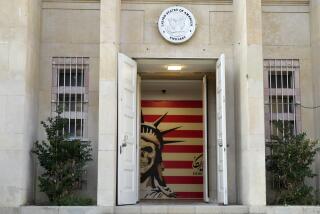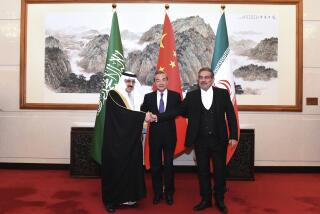Iran’s president-elect touts ‘moderation’ in address
TEHRAN — Bolstering his centrist image, Iranian President-elect Hassan Rowhani on Saturday vowed “moderation” in foreign and domestic affairs in his first major nationally televised address since his surprising election victory this month.
In an almost hourlong speech from the state broadcaster’s headquarters, Rowhani used some variant of the word “moderate” at least 10 times, signaling his intention to repair Iran’s fractured relations with the international community, while not compromising the Islamic Republic’s independence. In line with previous comments since his election, Rowhani sought to send out a message of optimism and tolerance.
“Moderation in foreign policy means constructive interaction, not submission and confrontation,” Rowhani said.
Known as the “sheik diplomat” because of his dual status as a cleric and Iran’s former nuclear negotiator, Rowhani has indicated that Tehran’s foreign policy would shift to greater engagement with the outside world. His conciliatory comments have contrasted with the confrontational and bombastic style of outgoing two-term President Mahmoud Ahmadinejad, who steps down in August.
Some analysts, however, have questioned whether Rowhani will be able to effect much change in the face of likely resistance from old-guard conservatives and possibly from Iran’s supreme leader, Ayatollah Ali Khamenei, who has the final say on major questions of state.
Some supporters fear that Rowhani could share the fate of reformist Mohammad Khatami, who was elected president in 1997 on a sweeping liberalization platform. Hard-line elements regularly thwarted Khatami’s reform agenda during his eight-year administration.
Rowhani, who is scheduled to take office in early August, made no direct mention of the nation’s controversial nuclear development program, a major source of tension with Washington and its allies. U.S. officials suspect that Iran seeks to make nuclear weapons, while Rowhani and other Iranian officials say the program is solely for peaceful purposes.
A centrist who gained support from Iran’s long-stymied reformist bloc, Rowhani was the unexpected winner of the June 14 presidential election, besting a number of conservative contenders regarded as favorites. The vote was widely seen as a repudiation of hard-line policies that have left Iran isolated and subject to withering international economic sanctions, contributing to rising prices and dwindling job opportunities, especially for the nation’s burgeoning young population.
Iran stands as an archenemy of a pair of key U.S. regional allies, Israel and Saudi Arabia. Neither nation wants Iran to have nuclear weapons capability. The White House has said that no option, including a military attack, is off the table to prevent Iran from obtaining such weapons.
Rowhani referred to Iran as “the most powerful country in the region,” but said that role required a balance “between reality and idealism.” He rejected the “enemy” depiction of Iran as a police state and called on the nation’s press to be free and balanced.
“In a country whose legitimacy stems from its people, there is no fear of the free media,” Rowhani said. “Oppression is bad in our enemies’ countries and in our own nation.”
Human rights groups and press freedom advocates have long accused Iran of arresting dissidents and cracking down on the news media, detaining journalists and shutting down opposition newspapers and websites.
Whether Rowhani’s promises of a less oppressive environment will become a reality remains to be seen. The new president must navigate amid several power blocs in Iran, including the staunchly conservative clerical leadership and the influential Revolutionary Guard Corps.
Rowhani has previously said that “brutal” international economic sanctions linked to the nation’s nuclear program could have been avoided through proper management of talks with outside powers, including the United States. He has linked a more conciliatory foreign policy to the possibility of modifying sanctions, which have choked the nation’s currency and made it difficult for Iran to sell oil, its principal export, and have access to the international banking system.
“The world is in a transitional mode and a new order is yet to be established,” Rowhani said. “If we miscalculate our national situation, it will be detrimental to us.”
On a delicate domestic issue, the president-elect seemed to hint at a softer approach by the nation’s so-called “morality police,” known for shuttering popular coffee shops and cracking down on behavior deemed un-Islamic, such as mingling between the sexes outside of marriage.
“People follow the morality code by themselves and care about it,” Rowhani said. “But if they forget, they should be admonished in a friendly [way]. ... No insult is acceptable.”
Special correspondent Mostaghim reported from Tehran and Times staff writer McDonnell from Beirut.
More to Read
Start your day right
Sign up for Essential California for news, features and recommendations from the L.A. Times and beyond in your inbox six days a week.
You may occasionally receive promotional content from the Los Angeles Times.






